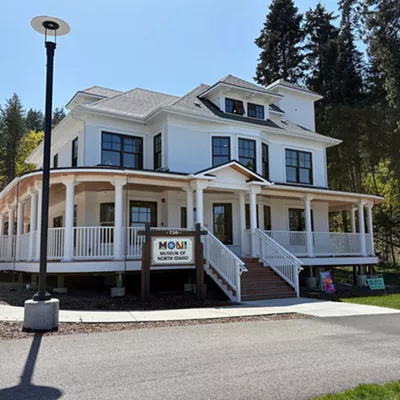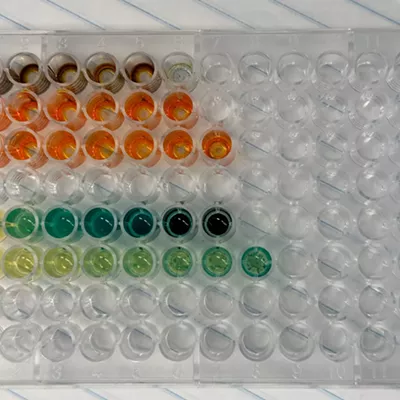
Over the last month, at least three Inland Northwest behavioral health options closed on what health providers hope will be a temporary basis, but there's no plan for when or whether they may reopen.
Providers at Kootenai Health in Coeur d'Alene and Frontier Behavioral Health in Spokane announced they were shuttering behavioral health units in May and June due to staffing shortages, funding issues and, in one case, low patient demand. At Kootenai Health, an inpatient addiction recovery unit closed along with outpatient adult behavioral health services. At Frontier, a 16-bed voluntary inpatient stabilization unit has closed.
"We ceased taking admissions in late May and closed the first few days of June," Frontier Behavioral Health CEO Jeff Thomas says of the 16-bed unit at 1401 N. Calispel Street. "We announced it as a temporary closure but, that said, we don't know when or even if it will reopen."
At Kootenai Health, the inpatient addiction recovery center provided about 200 patient stays per year. Kootenai Health spokeswoman Kim Anderson says they can't give an accurate count of how many patients were seen in the outpatient psychiatry practice because patient care had already been transferred out to other options such as telehealth by the time media started asking about the closure in May.
However, the Northern Idaho Crisis Center housed on Kootenai Health's campus serves 640 people per year, and the hospital will further subsidize that center in the wake of severe demand for mental health services and reduced funding from Idaho.
While other options in the area remain open, some are concerned about the closures, including former patients. Sasha Fisher, a 27-year-old Coeur d'Alene man who went through alcoholism treatment at the addiction recovery center at Kootenai Health in May, says the closure boggles his mind.
"It feels like you're telling the firefighters we don't need them and here we have fire season right around the corner," Fisher says. "If we shut this down, the next chemical dependency service is going to be the emergency room which is already overflooded, and we're going to be hopping the state [line] to another emergency service."
"If we shut this down, the next chemical dependency service is going to be the emergency room."
STAFFING AND FUNDING
At Frontier's 16-bed voluntary stabilization unit, patients with mental health needs could voluntarily receive treatment for typically two to three days. They were referred by other providers and evaluated before being admitted, Thomas says.
The unit, which opened in 2013, usually saw 14 or 15 of its beds full in 2017 and 2018, with a dip in patients starting in 2019, Thomas says.
Then, during the first part of the pandemic, the unit was limited to eight patients. But surprisingly, when the unit fully reopened in January 2021, the patient census continued to hover around seven people, Thomas says. That low count was not bringing in enough money to make the facility pencil out, Thomas adds.
"It's economically not viable because you don't get paid unless somebody's there, and you have certain staffing structures in place and costs," Thomas says.
It's hard to say whether the numbers declined in part due to the opening of more inpatient psychiatric beds in the region, including Inland Northwest Behavioral Health hospital and the Spokane Regional Stabilization Center where Spokane police may take people having mental crises, Thomas says.
"Does that perhaps create less need for a stabilization unit?" Thomas says. "We can't speak definitively to that, but one could speculate it could have an impact."
Frontier's unit was also affected by an ongoing staff shortage, with a roughly 30 percent vacancy in staff positions, Thomas says, mirroring the situation at other Frontier facilities.
With the closure, staff were given offers to work in similar positions at other Frontier locations and thankfully many accepted, potentially reducing the shortage in those programs, he says.
Staffing shortages are similarly impacting other organizations around Washington and the country. Thomas also serves on the Washington Council for Behavioral Health, and he says other member organizations recently reported similar shortages in a survey.
Kootenai Health, via printed talking points, also blamed its closures in part on reduced staffing, saying providers were either retiring, burned out from the pandemic, opting for telehealth work or leaving for higher paying jobs. To pay just one specialized physician to run the addiction recovery unit, Kootenai says it would need to come up with $1 million because those experts are in such high demand.
Kootenai also points to chronic underfunding in health care, noting Idaho could send some of a $119 million national opioid settlement its way, or perhaps draw from the projected state budget surplus of $1.9 billion.
"Kootenai Health agrees with those who are upset about the closure of this program. However, the current model of funding with the current model of services is simply unsustainable," the hospital's talking points state. "We look forward to the opportunity to seek creative solutions on a state and federal level with the support of all who care about these programs."
POSSIBLE SOLUTIONS
For patients like Fisher, the closures at Kootenai are concerning. Fisher was offered care in the addiction recovery unit after landing in the emergency room with suicidal thoughts in early May. A nurse told him they could help, but he wouldn't be able to go home before going directly to the inpatient recovery unit.
"I realized I wanted it and needed it," Fisher tells the Inlander. "It probably platformed me towards the direction of success more than any other decision I've made in my life."
Fisher says the 21 days he spent there taught him a lot. Learning about the biology, psychology and societal pressures around alcoholism was instrumental. He also says medication-assisted treatment helped slow his thinking and allowed him to process the classes and counseling.
"It helped to understand that, first of all, it's a disease. I never knew that," Fisher says. "I always got told it's just a matter of choice."
Fisher says he was orphaned in Russia and started drinking at just 5 years old with his then-caregivers before being adopted at 7. He learned he was predisposed to substance use issues.
He says being around peers from all walks of life also showed him how his assumptions of other "addicts" were misinformed, and how close he was to some of those situations himself.
"There were so many various people — military, nurses, teachers and people like me, in the hospitality industry — and all of a sudden I had this epiphany," Fisher says. "These are some of the strongest-willed people you'll ever meet. If they didn't have enough strong will to quit themselves, there must be more to it than just the power of will."
Fisher says he had asked for additional time in the unit, but because of the closure that was denied. However, he says he feels his time there set him on the right path to recovery. Since learning of the closure, he's expressed his frustration to politicians, even writing a letter to President Joe Biden. It's frustrating, he says, to hear the decision was apparently financial.
"The gap in accessibility and availability in health care services was already pronounced, then came the pandemic and this chasm was created, and now it's further extended by policy creators," he says.
Some in the community are working on alternatives. Chris Wright, a licensed counselor in Idaho, is working to form a spiritually based recovery program in the Coeur d'Alene area. While the program is still being developed, Wright says they hope to offer a seamless transition from the initial days of recovery to the continued counseling and treatment people may need.
"We are identifying each individual's needs with the goal to provide individualized care at the lowest possible cost," Wright says. "We will have providers in the community providing services as needed at the center or in their place of business for those who need it."
Frontier's Thomas says other options to help address the worker shortage include things like student debt forgiveness and loan repayment programs, changing funding mechanisms to offer more competitive pay structures, and perhaps using people with less training for some work.
"Part of it is seeing if there's more ways to increase the traditional workforce, but also to tap individuals of different grades to fortify the workforce," Thomas says. "Because we're not going to catch up to this and resolve all the behavioral workforce crisis by waiting it out." ♦
























